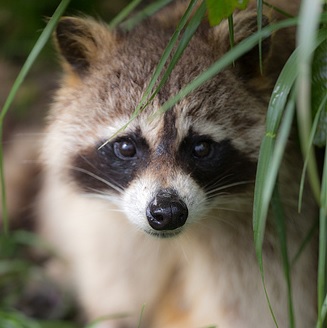Why You Don’t Want Raccoons Around Your Property
By Chris Williams on September 3, 2013.
 Question
Question
We seem to have a raccoon nesting in your yard. We haven’t found the nest yet, but we see the raccoon and its evidence frequently. We can’t leave our garbage cans outside anymore. I would like to get rid of the raccoon but my kids are begging me to leave it alone. They think it’s cute. I’m looking for another opinion.
Answer
There’s no denying they’re cute, but unless you’ve dealt with raccoons, you don’t realize how destructive they can be. Not only can they cause a great deal of damage if left unchecked, but they can spread rabies and roundworms to humans.
Damage
You’re already familiar with raccoons’ exceptional skills in breaking into even animal-proof garbage cans. Raccoons are strong and clever and, once determined, they are difficult to deter. See our blog, “Keeping Raccoons Out of Your Garbage Cans” (May 12, 2011) for tips.
Raccoons can do damage to your home when they try to get into attics. They will tear off shingles or rooftop ventilators and chew holes into soffits or fascia boards. Once inside an attic, raccoons will tear up insulation for nest material, contaminate items with urine and feces, and will chew on electrical wiring causing a fire hazard.
In your garden, raccoons will steal produce, hollow out melons, and pull corn off of the stalk. They damage lawns while digging for grubs and insects to eat.
Roundworm
Raccoon roundworms can be passed to humans who have had contact with raccoon feces or the soil around it. The roundworms are spread when they are accidentally ingested or eggs are inhaled. Children are most at risk when they eat dirt or when they get eggs on their hands or on objects and then put them in their mouths. Roundworm infection can result in various symptoms, including blindness. Make sure you and your children avoid raccoon bathroom sites. It’s not recommended that you try to clean up a raccoon “latrine” area since the job requires special procedures and equipment, including a respirator.
Rabies
Human rabies is rare but most of the cases among animals in the U.S. occur among raccoons. Raccoons spread rabies more often than any other animal, and rabies spread by raccoons occurs most often in eastern states. You don’t have to be bitten by a rabid raccoon to get rabies; it can also be transmitted by contact with a raccoon’s saliva. Make sure you and your children keep your distance from raccoons. If you see a raccoon acting strangely, contact your local animal control office.
You should have a wildlife removal expert trap and remove the raccoon(s) from your yard. Some pest control companies, like Colonial, have wildlife experts that are trained and licensed in humane removal of nuisance wildlife. Our technicians can locate the raccoons’ den, trap them, and also advise you on steps you can take to make your yard less attractive to raccoons and other nuisance wildlife. Give Colonial a call today.
Sign up for our biweekly email newsletter for more information about bugs and pests!